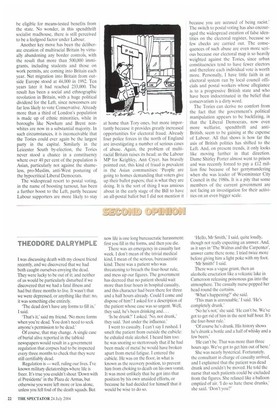THEODORE DALRYMPLE
I was discussing death with my closest friend recently, and we discovered that we had both caught ourselves envying the dead. They were lucky to be out of it; and neither of us would be particularly disturbed if we discovered that we had a fatal illness and had but three months to live. It wasn't that we were depressed, or anything like that: no, it was something else entirely.
'The dead don't have any forms to fill in,' I said.
`That's it,' said my friend. 'No more forms when you're dead. You don't need to seek anyone's permission to be dead.'
Of course, that may change. A single case of burial alive reported in the tabloid newspapers would result in a government regulation that corpses had to be inspected every three months to check that they were still certifiably dead.
Regulation is — well, ruling our lives. I've known military dictatorships where life is freer. It's true you couldn't shout 'Down with el Presidente' in the Plaza de Arnias, but otherwise you were left more or less alone, unless you fell foul of the death squads. But now life is one long bureaucratic harassment: first you fill in the forms, and then you die.
There was an emergency in casualty last week. I don't mean of the trivial medical kind, I mean of the serious, bureaucratic kind. There was a patient who was threatening to breach the four-hour rule, and mess up our figures. The government has decreed that no patient should wait more than four hours in hospital casualty, and this character had been there for three and a half hours already. Could I come and dispose of him? I asked for a description of the patient whose case was so urgent. Well, they said, he's been drinking and . . .
`Is he drunk?' I asked. 'No, not drunk,' they said. `Just under the influence.'
I went to casualty. I can't say I rushed. I smelt the patient from outside the cubicle: he exhaled stale alcohol. I heard him too: he was snoring so stertorously that if he had been made of metal he would have broken apart from metal fatigue. I entered the cubicle. He was on the floor, in what is known as the recovery position, to prevent him from choking to death on his own vomit. It was most unlikely that he got into that position by his own unaided efforts, or because he had decided for himself that it would be wise to do so. 'Hello, Mr Smith,' I said, quite loudly, though not really expecting an answer. And, as it says in 'The Walrus and the Carpenter', answer came there none. I tried twice more before giving him a light poke with my foot.
`Mr Smith!' I said.
There was a vague grunt, then an alcoholic eructation like a volcanic lake in Cameroon releasing poisonous gas into the atmosphere. The casualty nurse popped her head round the curtains.
'What's happening?' she said.
`This man is unrousable,' I said. 'He's completely drunk.'
'No he's not,' she said. 'He can't be. We've got to get rid of him in the next half hour. It's the four-hour rule.'
'Of course he's drunk. His history shows he's drunk a bottle and a half of whisky and a few beers.'
'He can't be. That was more than three hours ago. We've got to get him out of here.'
She was nearly hysterical. Fortunately, the consultant in charge of casualty arrived, and I explained that the patient was dead drunk and couldn't be moved. He told the nurse that such patients could be excluded from the figures. She relaxed like a balloon emptied of air. 'I do so hate these drunks,' she said. 'Don't you?'


























































 Previous page
Previous page